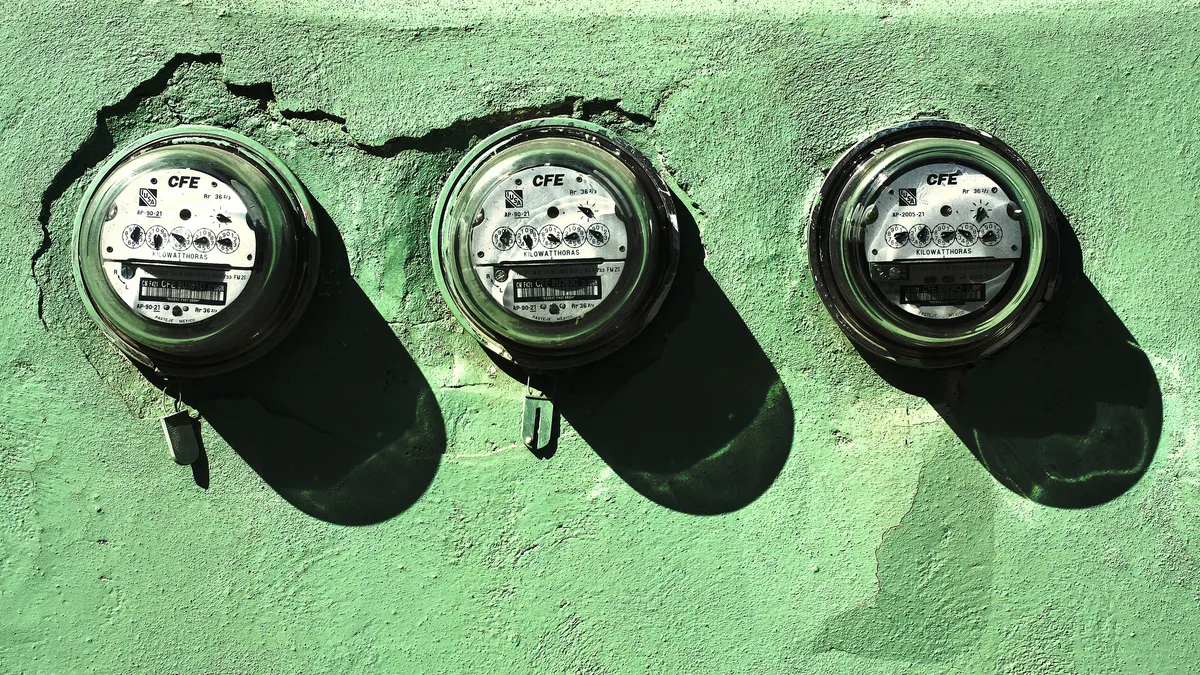Update: The Public Utilities Commission of Texas on April 20 adopted smart meter rules that remove the requirement for electric utilities to offer home area network features and set minimum capabilities for on-demand reads of customers' advanced meter data.
Dive Brief:
- The Public Utilities Commission of Texas (PUC) on April 20 approved new smart meter rules that utilize on-demand data reads as opposed to real-time information sharing with home appliances and systems that can respond to price and electric usage.
- Demand response providers had pressed for greater data access to give customers more control over their energy usage. But utilities say the technologies capable of utilizing real-time access have not been widely adopted, and real-time requirements would be more costly to consumers.
- The PUC staff's recommendation would allow utilities outside of the Electric Reliability Council of Texas (ERCOT) to recover costs related to smart meters. The data sharing provisions, however, would impact all utilities in the state.
Dive Insight:
Advocates for demand side management technologies say the rulemaking in front of Texas regulators is better than past iterations, which had proposed greater limits on real-time data access. But they also say the rule does not fully empower customers.
The commission's proposal "is much improved from its previous version, although it still falls short of assuring that Texas consumers who have paid for and will continue to pay for smart meters through rates have sufficient access to real-time or near real-time data to better control their energy use," Cyrus Reed, conservation director of Sierra Club's Texas chapter, told Utility Dive in an email.
An earlier version of the proposed rule had set a limit on the number of on-demand meter reads utilities were required to execute, but that cap has been eliminated, according to Reed.
Reed said PUC staff has added "important language to assure that customers can share data and programs with third-parties ... although ultimately we believe the Commission should make additional changes to assure improved access to real-time data."
The PUC had previously adopted rules that provided for real-time access to customer data, according to Michael Jewell, a consultant who filed comments for ERCOT demand response provider Enel X and for the Solar Energy Industries Association. But the latest proposal would scrap that expectation, based on a previous 2018 settlement with utilities that eliminated the requirement for electric companies to allow new customers to install Home Area Networks (HAN).
HAN technologies, which allow customers to monitor their energy usage in real-time, did not gain traction with customers, Jewell said. But he also says scrapping smart meter requirements that enabled them would be a mistake.
"There is so much focus that has been put on the Home Area Network, which is an older technology that did not have great customer uptake," Jewell told Utility Dive. "What is being ignored, is there is new technology that could meaningfully take advantage of real-time data."
"To close the opportunity for that communication with the meters, at the very time when that technology is coming to the fore, doesn't seem to be forward looking," Jewell said.
A HAN or other real-time technology "gives you the ability to see what is going on in the home at any given time," said Jewell. "On-demand meter reading is a snapshot of what's going on."
Allowing for real-time data access would give more sophisticated appliances the capability of responding to higher energy prices and reducing demand during times of high use.
Oncor Electric, the largest electric utility in Texas, told Utility Dive that it stands by previous comments it had filed in the PUC proceeding.
"The technology associated with tracking energy usage, including advanced meters, has significantly evolved," the utility said. "New technologies that did not exist 10 years ago have been developed, and some technologies that were viewed as promising 10 years ago have been superseded by other technologies."
Among rule changes Oncor and other ERCOT utilities want to see is a clarification that the term "two-way communications" refers to the ability of advanced meters to communicate with the electric utility — not necessarily devices inside the home.
Oncor filed its comments along with AEP Texas, CenterPoint Energy, Houston Electric and Texas-New Mexico Power. Collectively, the utilities have rolled out more than 7 million meters in the Lone Star State.
Non-ERCOT utilities, including Southwestern Electric Power, El Paso Electric, Entergy Texas and Southwestern Public Service Company, are also opposed to maintaining real-time data requirements.
On-demand reads are "the reasonable minimum capability that should be required considering that it appears few customers need or want HAN," the non-ERCOT utilities said in their comments.
According to Jewell, however, Texas is seeing a reduction in customers with HAN because a previous smart meter settlement eliminated requirements that the customers be allowed to install the monitoring system. The gradual reduction of HAN, as people move, is a natural result of that decision — as is the increase in on-demand reads.
"This is a result the commission itself has mandated since no additional HAN devices may be added and customers may only use on-demand reads if they do not have a HAN," Jewell said.
Observers say the PUC is likely to adopt the new smart meter rules at its Friday meeting.














